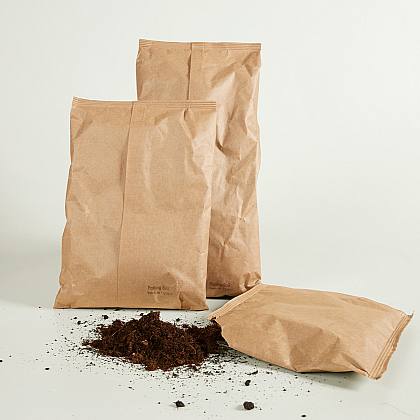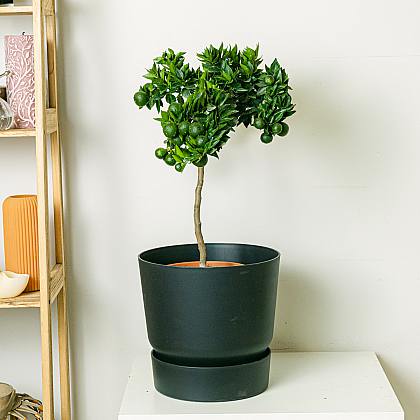Revitalize Your Roses With Powerful Organic Feed
As a devoted gardener, I've always taken pride in caring for my roses. Their beauty and fragrance bring such joy to my garden.

As a devoted gardener, I've always taken pride in caring for my roses. Their beauty and fragrance bring such joy to my garden.
However, I've learned that providing the right nutrients is crucial for their health and vitality. That's why I've discovered the incredible benefits of organic feed.
In this article, I'll reveal the secrets to revitalizing your roses with powerful organic feed. From DIY recipes to feeding tips, join me on this journey to transform your garden into a haven of vibrant, healthy blooms.
Importance of Fertilizing Roses
Fertilizing roses is essential for maintaining their health and promoting strong growth. One of the advantages of using organic fertilizers is that they provide nutrients to the soil in a slow-release manner, ensuring long-term nourishment for the roses.
These fertilizers are made from natural sources such as composted chicken manure, worm castings, and alfalfa meal, which enrich the soil with essential minerals and organic matter. To effectively fertilize your roses, start by mixing the organic fertilizer according to the recommended amount on the packaging. Work the fertilizer into the soil around the base of the rose, making sure it reaches the roots. Water the blend well to activate its nutrients.
It's important to fertilize roses 2 to 4 times a year, adjusting the schedule based on your climate and flowering patterns. By following these tips and using organic fertilizers, you can ensure that your roses stay healthy and vibrant.
DIY Recipe to Feed Roses
I love using a simple DIY recipe to feed my roses and give them the nutrients they need to thrive.
One of the benefits of using organic fertilizers is that they provide a slow-release of nutrients, ensuring that the roses are fed consistently over time.
To maximize the effectiveness of the DIY rose feed, there are a few tips to keep in mind.
First, it's important to mix the ingredients according to the recommended amount on the rose and flower food box. This ensures that the roses receive the proper balance of nutrients.
Additionally, make sure to work the fertilizer into the soil to reach the roots of the roses. This helps the plants absorb the nutrients more efficiently.
Finally, remember to water the roses regularly to activate and continue the work of the organic fertilizer.
How to Use the Food on Roses
To ensure the maximum benefit from the DIY rose feed, it is important to use the food on roses regularly. Using the right amount of food on roses is crucial for their growth and health. Here is a simple guideline for applying the food:
| Rose Bush Size | Amount of Food |
|---|---|
| Large | 1 to 2 cups |
| Medium | 1 to 1 1/2 cups |
| Small | 1/2 to 1 cup |
To use the food on roses, mix the recommended amount in a large pail for easy application. Dig a well around the base of the rose, between the trunk and the drip line. Cover the well back up and water the blend in well. Remember to never fertilize a dry rose plant; water it first before feeding.
Knowing when to fertilize roses is also important. Feed roses 2 to 4 times a year for best results. In coastal California, feed in March, May, July, and at 1/2 strength in early September. Adjust the feeding schedule based on climate and flowering patterns. In colder climates, start after the danger of frost has passed and stop feeding 6-8 weeks before the first frost. Warmer climates may require 3-4 feedings, while colder climates may only need 2. Regular and proper feeding will help your roses thrive and produce beautiful blooms.
Frequency of Feeding Roses
Feeding roses regularly throughout the year is essential for their optimal health and blooming. Here are some tips for successful rose fertilization and the advantages of using organic fertilizers:
Frequency:
- Feed roses 2 to 4 times a year for best results.
- Adjust the feeding schedule based on climate and flowering patterns.
- Warmer climates may require 3-4 feedings, while colder climates may only need 2.
- In coastal California, feed in March, May, July, and at 1/2 strength in early September.
- Start after the danger of frost has passed in colder climates and stop feeding 6-8 weeks before the first frost.
Organic Advantage:
- Organic fertilizers take longer to work but are effective for a longer period of time.
- They promote healthier roses by improving soil structure, increasing nutrient availability, and enhancing microbial activity.
Recommended Brands:
- Consider using organic fertilizer brands like Dr. Earth, Down To Earth, E.B. Stone, Gardener & Bloome, and Fox Farm Happy Frog.
- These brands are known for their quality and effectiveness.
- Online shopping makes it easier to order these brands from the comfort of your home.
Recommended Organic Fertilizer Brands
When it comes to choosing the right organic fertilizer for your roses, there are several recommended brands that you can consider. Dr. Earth and Down To Earth are favored organic fertilizer brands that provide the necessary nutrients for your roses. E.B. Stone and Gardener & Bloome are also highly recommended options. Although it may be harder to find, Fox Farm Happy Frog is a great brand known for its effectiveness. These organic fertilizers take longer to work but are effective for a longer period of time.
When choosing a brand, consider the best time to fertilize roses, which is usually in early spring and late summer. Look out for signs of nutrient deficiency in roses, such as yellowing leaves or stunted growth, as this may indicate the need for fertilization. Remember to follow the instructions on the packaging for the best results.
Benefits of Regular Feeding
With regular feeding, I've witnessed the remarkable benefits that it brings to my roses. The advantages of regular feeding and using organic fertilizers are truly remarkable. Here are three key benefits to consider:
Enhanced growth and vitality: Regular feeding provides essential nutrients and minerals that roses need to thrive. This promotes healthier growth, stronger stems, and lush foliage, ultimately leading to more vibrant and abundant blooms.
Increased resistance to pests and diseases: Organic fertilizers contain beneficial microorganisms that help build a strong defense system in roses. This makes them more resilient to common pests and diseases, reducing the need for chemical interventions.
Environmental sustainability: Organic fertilizers are derived from natural sources and promote soil health. They improve soil structure, retain moisture, and foster beneficial microbial activity. By using organic fertilizers, you not only nourish your roses but also contribute to a healthier and more sustainable garden ecosystem.
Tips for Mixing and Applying the Feed
To properly mix and apply the organic feed for your roses, I start by gathering all the necessary ingredients and tools. The mixing ratios for different types of roses may vary, but a general rule of thumb is to use approximately 1 part Rose & Flower Fertilizer, 1 part Alfalfa Meal, and 1/2 part Composted Chicken Manure or Worm Castings.
These ingredients can be mixed in a large pail in bulk for easy application. Alternatively, there are alternative organic fertilizers for roses available in the market, such as Dr. Earth, Down To Earth, E.B. Stone, Gardener & Bloome, and Fox Farm Happy Frog.
Once the feed is mixed, dig a well around the base of the rose, between the trunk and the drip line, and cover it back up. Water the blend in well and make sure to never fertilize a dry rose plant.
Remember to adjust the feeding schedule based on climate and flowering patterns, feeding roses 2 to 4 times a year for best results.
Adjusting Feeding Schedule for Different Climates
In different climates, I adjust the feeding schedule for roses to ensure optimal growth and health. Adjusting the feeding schedule based on regional variations and optimal feeding times is crucial for the overall well-being of the roses.
Here are three key factors to consider when adapting the feeding methods for roses in different climates:
Regional variations: Different climates have varying temperature ranges and moisture levels, which directly impact the nutrient requirements of roses. Understanding the specific needs of roses in your region will help you determine the appropriate feeding schedule.
Optimal feeding times: Roses have specific growth and flowering patterns that vary based on climate. By adjusting the feeding schedule, you can provide the necessary nutrients during key growth stages, such as before the onset of blooming or during active growth periods.
Adapting feeding methods: container gardening and hydroponic systems are popular methods for growing roses in climates where traditional garden beds may not be feasible. In these cases, it's important to modify the feeding schedule and methods to suit the specific requirements of these alternative growing systems.
Advantages of Organic Fertilizers
Organic fertilizers offer numerous benefits that enhance the overall health and vitality of roses. Unlike chemical fertilizers, organic options are derived from natural sources and are free from synthetic additives. Here are some advantages of using organic fertilizers for your roses:
| Advantages of Organic Fertilizers |
|---|
| 1. Environmentally friendly |
| 2. Improves soil health |
| 3. Slow-release nutrients |
Organic fertilizers are environmentally friendly as they do not contain harmful chemicals that can leach into the soil or waterways. They promote soil health by increasing organic matter content, improving soil structure, and enhancing microbial activity. This, in turn, helps roses absorb nutrients more effectively. Additionally, organic fertilizers provide slow-release nutrients that are released gradually over time, ensuring a steady supply of essential elements for your roses.
In contrast, chemical fertilizers have their own set of pros and cons. While they provide immediate results and precise nutrient ratios, they can also harm beneficial organisms, deplete soil fertility, and contribute to water pollution. Therefore, organic fertilizers are a safer and more sustainable choice for your roses.
Convenient Online Shopping for Fertilizer Brands
I personally find it convenient to shop for fertilizer brands online. There are several benefits to purchasing fertilizers online:
Wide variety: Online shopping allows me to explore and compare different types of organic fertilizers from various brands. I can easily find the specific products I need for my roses without having to visit multiple stores.
Detailed information: Online platforms provide detailed descriptions, reviews, and ratings for each fertilizer brand. This helps me make an informed decision based on the pros and cons of organic vs. synthetic fertilizers. I can also compare the ingredients, nutrient content, and recommended usage of different organic fertilizers.
Easy delivery: Once I've selected the desired fertilizer brand, I can simply place an order and have it delivered to my doorstep. This saves me time and effort, especially if the brand I prefer isn't readily available in local stores.
In conclusion, by using powerful organic feed, you can revitalize your roses and see them thrive in your garden. The DIY recipe provided, along with tips on how to use the food and the frequency of feeding, will help you achieve vibrant and healthy blooms.
Organic fertilizers offer numerous advantages, promoting strong growth and resistance to pests and diseases. With the convenience of online shopping for recommended brands, you can easily access the nutrients your roses need for optimal health and beauty.


